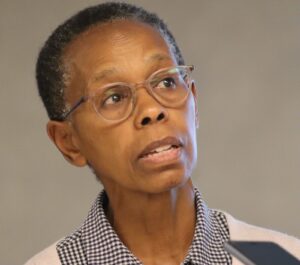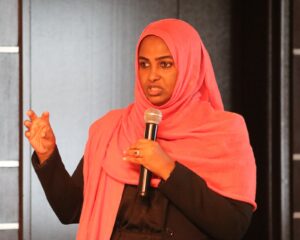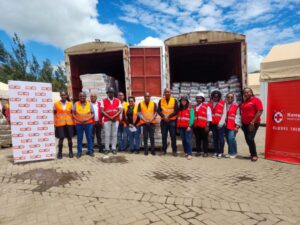
By Melisa Mongina
Cervical cancer is unique as we know the causes of the disease and the tools to prevent cure, and support survivors. Worldwide governments have committed to the ambition to eliminate cervical cancer with the first step of reaching the WHO 90:70:90 targets by the year 2030.
Stakeholders gathered in Nairobi have urged the church and the media to ensure they play their pivotal role in offering support to cervical cancer and HPV patients, adding that the patients should get spiritual support from the church and that the media should help create cancer and HPV awareness occasionally.
Speaking on Thursday in Nairobi during the three-day convening, Karen Nakawala a Cervical Cancer survivor and founder of Teal Sisters Foundation from Zambia, encourages patients diagnosed with cervical cancer to go to church for psychosocial support because it will be helpful to them since the hospitals cannot offer such. She further adds that the church should be part of this journey and help navigate the patients and also offer counselling not only to the women but also to their family members and caregivers since it affects anybody related to the patients.
“I talked about running away from the church during my treatment, but I shouldn’t have, I should have run to the church to get the love and the psychosocial support because you can not get it from the hospital. So I think that it is time for the church to step in and fight from the beginning to the end by helping to navigate the patient, by counseling, and by psychosocial because when a woman is going through the cancer journey she doesn’t suffer alone; her family suffers too and also even their caregivers. Support is not only about finance, it is about lifting somebody spiritually,” highlighted Nakawala.
Additionally, Nakawala notes the important role the media carries and urges the media to create awareness by telling stories about cervical cancer occasionally and not to make it a topical issue by reporting matters of cancer only when it is cancer awareness month. She further encourages the media to help in highlighting the challenges that cancer patients go through, the inequities that are in the distributions and life-saving interventions
“ And to our friends in the media, you have neglected this part so much yet you have a critical role to play. The media only writes about any cancer when it is a topical issue. Cancer is not a topical issue, the way you write about football even without being told to write about it, is the same way you should write about cancer because it doesn’t choose who to attack. As the media you can help to highlight the challenges that I have spoken about as a cancer survivor, the challenges that the patients are going through, the iniquities that are in the distribution and life-saving interventions,” said Nakawala.
Nakawala also notes that the media can highlight the positive stories that can help and give hope to a woman who is suffering from cervical cancer and is on the verge of giving up. She further encourages the media to create awareness of the importance of screening occasionally to save lives and prevent the spread of cancer at its early stage.
“The media can help us highlight the positive stories. I think I’m a positive story and my story offers hope to a woman being diagnosed right now and she thinks that she is going to die. If you highlight my story, that woman will have hope,” emphasized Nakawala.
In addition, Sister Regina Nthenya of the Health Association of Sisterhoods of Kenya (HASK) urges the crowd to be committed to telling others about the reality of HPV and how it is claiming a lot of lives. She adds that they should also share the benefits of the solutions.
“As we commit this day, can we also be committed to telling the people that this disease is real, it is claiming young lives, and there is hope for solutions? Let us also share the benefits of the solution, the side effects of the solutions, and let us give them the right to mind, faith, and reason so that they can understand and decide for themselves out of the informed choices,” said Sr. Regina.
Further, Sr. Regina noted behavior change and encouraged the girl child and parents should be helped to understand how to instill values and enhance moral behaviors since HPV is a sexually transmitted disease.
“We all know HPV is a sexually transmitted disease, if we do not talk and help people; the girl and the parents to understand values, to enhance moral behaviors, to make changes or to modify, they will test after five years and by the time they are reaching forty-five, half of those who tested negative will be positive,” added Sr. Regina.
Sr. Regina nudged the people of faith to offer support and help educate the communities by encouraging them to take care of themselves.
“As people in the faith community, we can help in educating people in the communities by speaking about HPV, let us not shy off, let us share all the information needed to be given and encourage them to take good care of themselves,” stated Sr. Regina.
In an interview, Imam Alidou Ilboudo a Muslim Religious Leader of Burkina Faso said that they are trying to give people the right information to prevent and overcome the cultural perspectives and barriers that affect the uptake of HPV vaccine among the Muslim communities. He adds that in the Muslim community they encourage polygamous marriage, thus urging the men to take care of their wives and if one of the wives is sick the men should ensure proper treatment for her.
“Those barriers cultural and religious exist and as religious leaders, we are trying to give the correct message to the people. Message that would promote human dignity in fighting those barriers. Health is important to human life and the Quran says that people should treat whatever is affecting the human person. Islam recognizes and accepts polygamy and it also encourages the man to be able to take care of his women, if one is affected she should be treated immediately,” noted Imam.
According to Fr. Charles Chilufya, Chair Convening Preparation Committee of Africa Health and Economic Transformation Initiative (AHETI), the church does not manufacture nor make money, thus it mobilizes resources from outside and from within to meet the poor. He adds that the church has infrastructures in the rural areas for people who are unable to come to Nairobi for treatment.
“When we see somebody hungry there are means that the church uses to support such people. The church does not manufacture money nor make money but it mobilizes resources from outside and from within to meet the poor. There is this arm which is called charity that reaches out to those who cannot access medical help. We have infrastructures in the rural area because we care and understand that there are people who cannot come to Nairobi for their treatments,” stated Fr. Charles.
Faith leaders, Health professionals and experts, health community advocates, and policymakers convened in Nairobi from the 11th to the 13th of June, 2024 under the theme of uniting faith and science against Cervical Cancer. The three-day convening on Cervical Cancer and HPV Vaccination was organized by the Africa Health and Economic Transformation Initiative (AHETI) and Justice and Ecology Network Africa (Jesuits Africa) in collaboration with key stakeholders, including KILELE Health Association.












